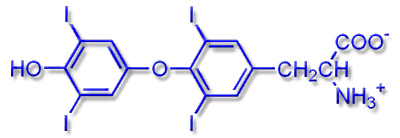Thyroxine - an Iodine Containing Thyroid Hormone
The thyroid gland is the largest gland in the throat area. Its iodine containing hormones tetraiodothyronine (thyroxine or T4) and triiodothyronine (T3) play a part in nearly all cells, where they activate metabolism; in other words, they regulate functioning.
The thyroid hormones are responsible for "activating" the heart and circulation; they increase the pumping capacity of the heart muscle and the pulse frequency, increase metabolism of protein, sugar and fat, by which they regulate body weight (weight loss accompanies excessive function due to increased use of energy; insufficient function leads to weight gain due to a lower energy use). Bone metabolism and the nervous system are also influenced.
Iodine is therefore an important trace element. A sufficient amount of iodine is essential for numerous metabolic processes. Youth and adults need about 200 µg of iodine per day.
Schematic depiction of tetraiodothyronine (thyroxine) |
3D-Depiction of tetraiodothyronine (thyroxine) |
|
|
|
Comparison of thyroxine and triiodothyronine

